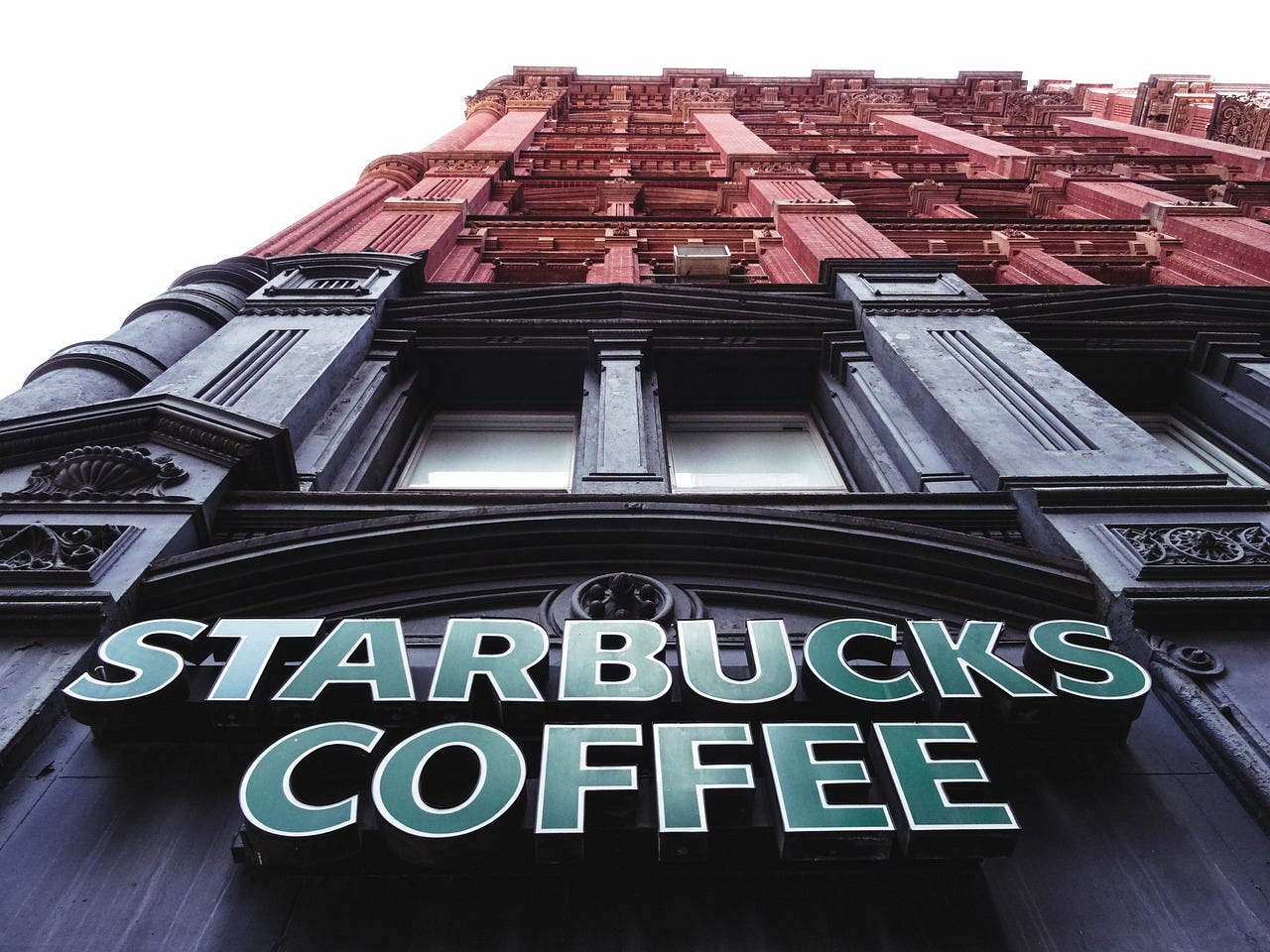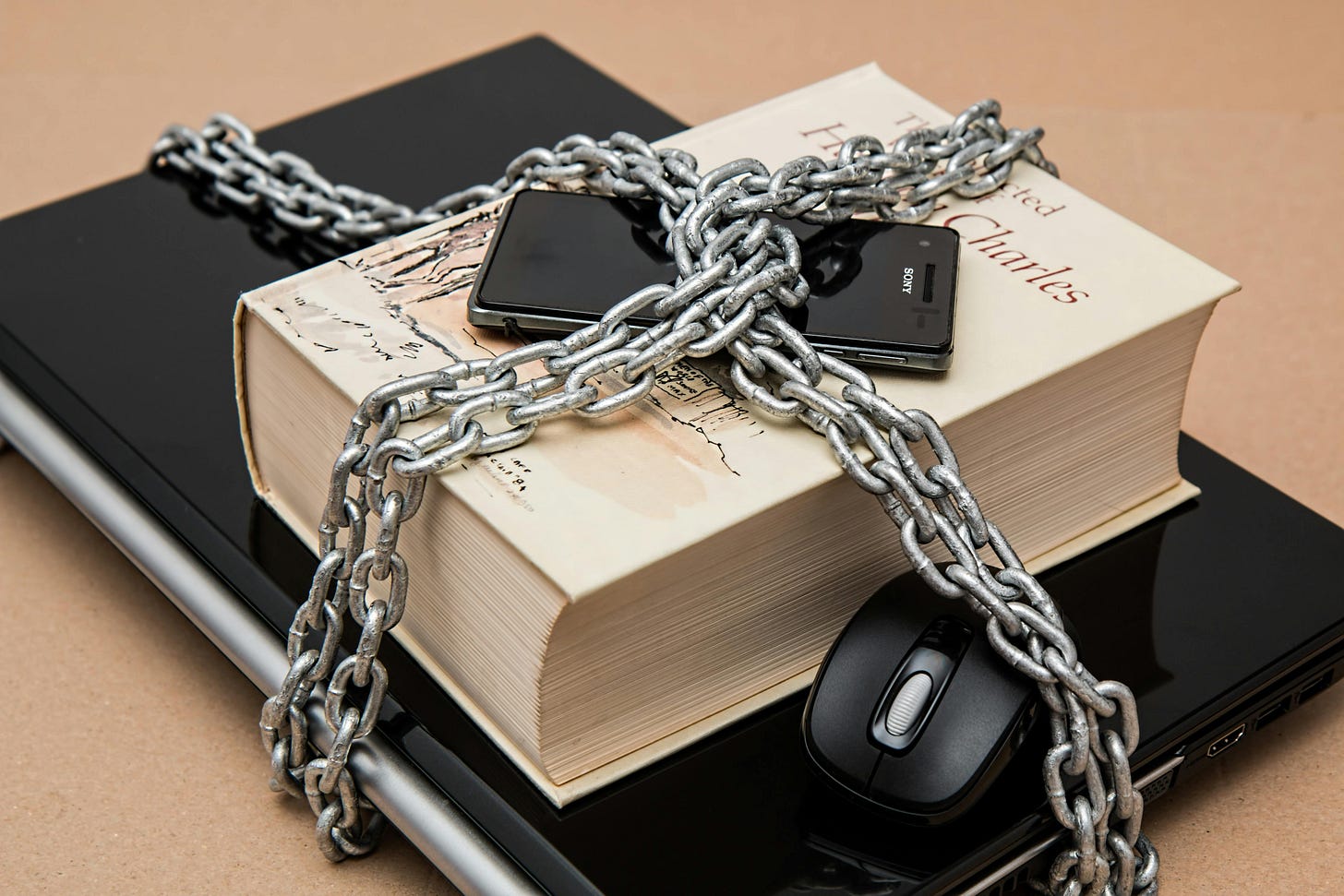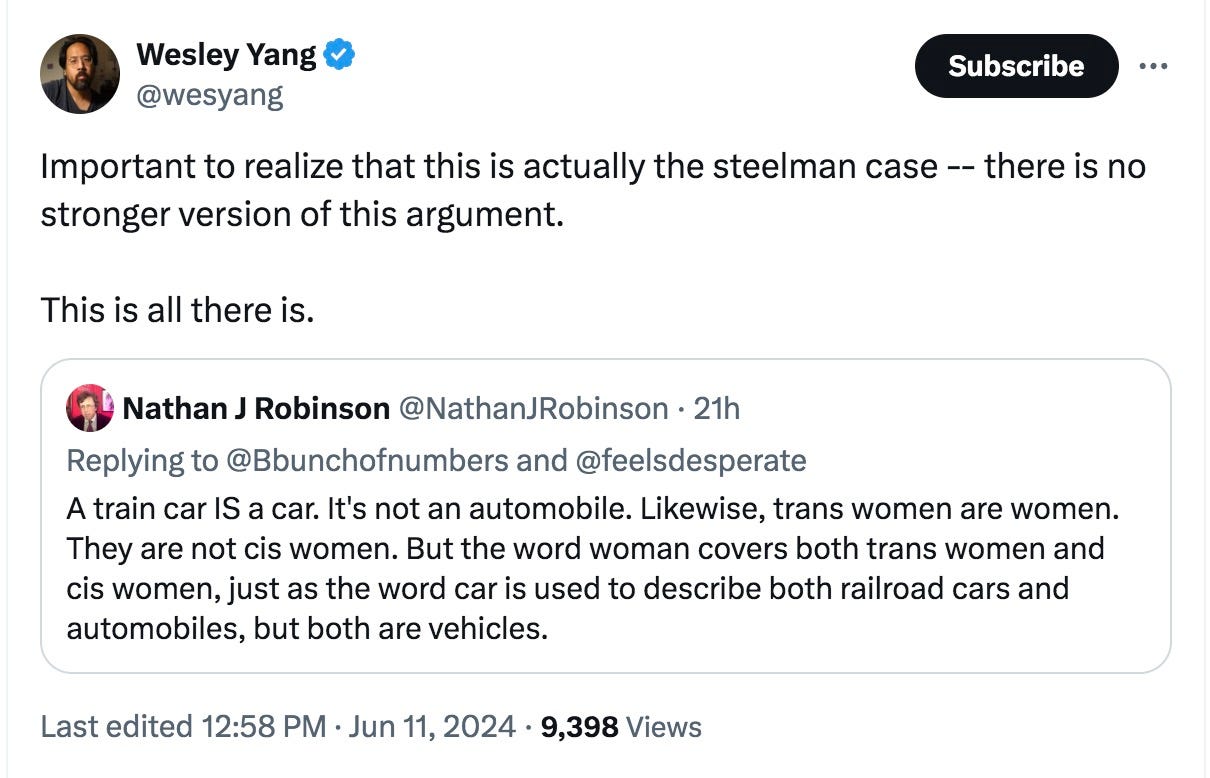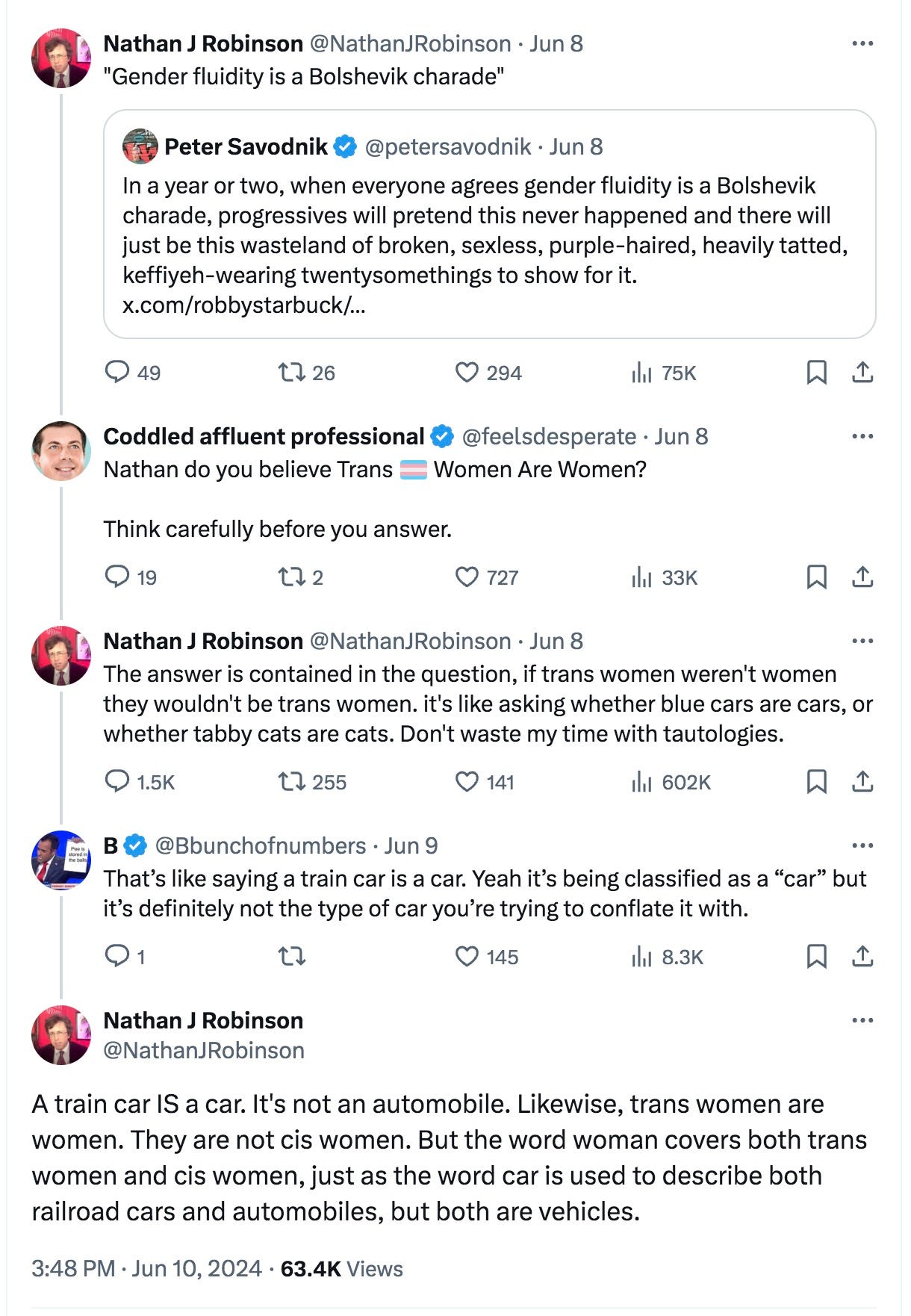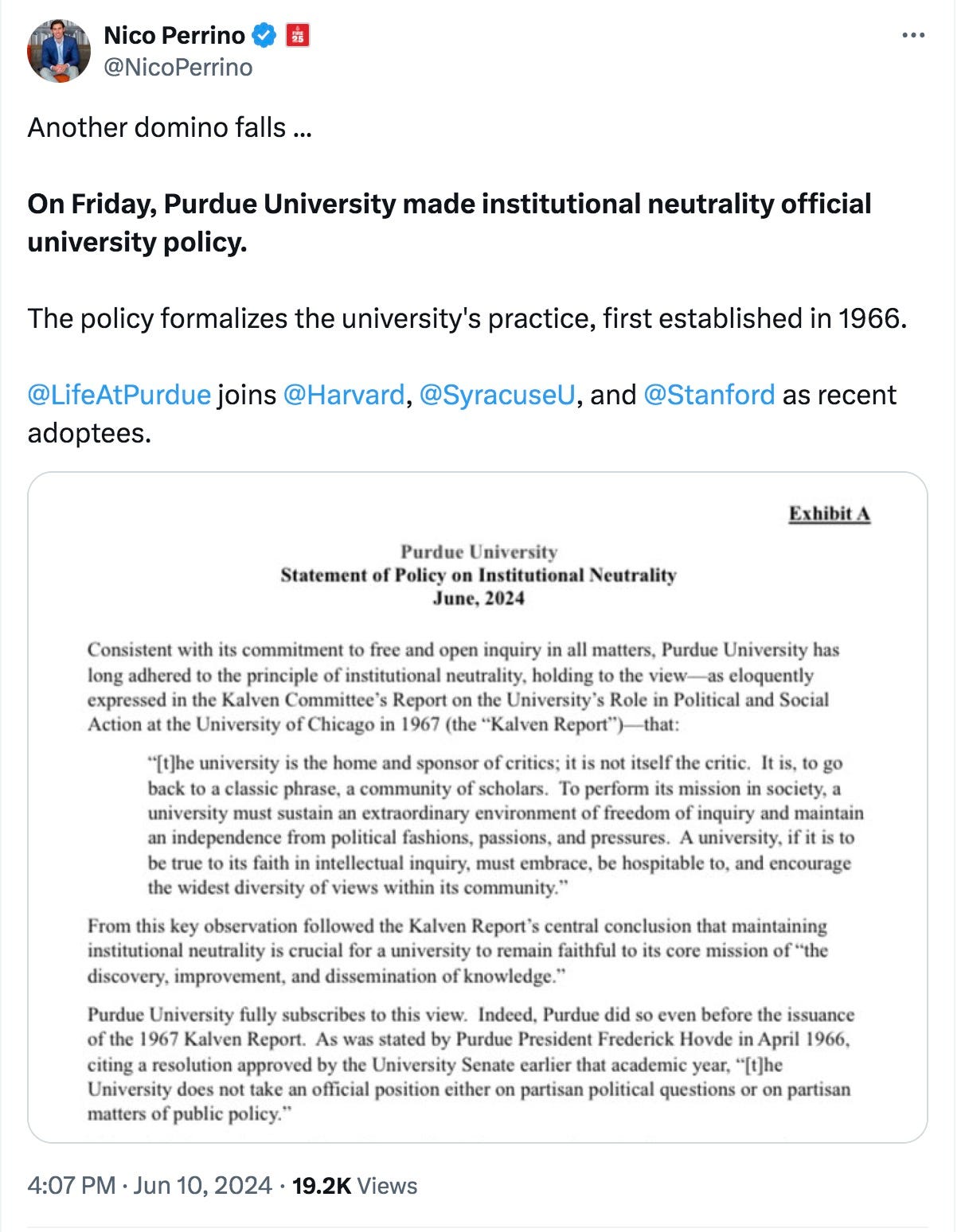E-Pluribus | June 11, 2024
Starbucks' star is falling; a "ban" by any other name; and the "educated class" is flunking.
A round-up of the latest and best musings on the rise of illiberalism in the public discourse:
John Masko: Starbucks’ political activism has backfired
For a while, it seemed like Starbucks was always in the news for one cause or another. Writing for UnHerd, John Masko says its extracurricular activities have finally caught up with the (alleged) retail coffee giant.
Like so many companies, the coffee giant [Starbucks] was swept up in the political maelstrom of 2020 and 2021. It pledged $100 million for businesses focused on “advancing racial equity”. It allowed employees to wear activist clothing and accessories to work, provided that the clothing supported the Black Lives Matter movement. In many Starbucks stores, June Pride Month celebrations went from discreet lapel pins to wall-covering shrines.
But when America’s political pendulum began to swing back the other way, these efforts proved far more problematic for Starbucks — which serves American cities as diverse as Seattle in Washington and Sheridan in Wyoming — than they have for Ben & Jerry’s. In 2023, when Starbucks managers began pulling back on Pride displays in stores, workers at 150 outlets went on strike.
Around the same time, the company found itself the target of activist lawsuits from shareholders over its DEI policies. Labour groups began to question the contrast between Starbucks’ political progressivism and its anti-union employment policies. And late last year, most troubling so far for the company’s bottom line, Starbucks found itself squarely in the crosshairs of public passions over the war in Gaza.
The controversy began last October following the Hamas attack on Israel, when a social media account operated by a Starbucks employee union posted the message “Solidarity with Palestine”. Starbucks’ corporate arm, reasonably worried about offending customers, denounced the message and filed a lawsuit against the union for using Starbucks insignia as part of the message. Angered by the suit, Left-leaning pro-Palestinian customers began to boycott the company.
[. . .]
. . .The two lessons Starbucks and other companies should learn from this ongoing debacle are far deeper: first, if you become a political company, you have to pick a side and stick with it. Second, if you already are a political company, if an issue is important to your customers, you cannot claim neutrality, as apolitical companies can. Far better to leave politics to the citizens of our free society, and focus on selling coffee.
Read the whole thing.
Elizabeth Blair: What’s a book ban anyway? Depends on who you ask
It’s difficult to find anyone who will wholeheartedly support “book banning.” However, establishing what “banning a book” consists of is anything but straightforward these days (as we have noted in the past). Here’s Elizabeth Blair at National Public Radio on the subject.
The practice of censoring books has been around for centuries. But what does it actually mean to ban a book today?
[. . .]
Kasey Meehan, program director of PEN America’s Freedom to Read (speaking at a video press conference in April) : “We define a book ban as any action taken against a book based on its content that leads to a previously accessible book being completely removed from availability for students or where access to a book is restricted or diminished. PEN is perhaps a bit unique, and that's in contrast to ALA [American Library Association] and some others, in that we do include books that have been removed while awaiting review as a ban. We include that because we know books are undergoing review. As long as they are removed from access for students, those books can be removed for weeks, months, upwards of a year as we've seen in some cases.”
NOTE: The American Enterprise Institute took exception to PEN America’s definition. A study AEI conducted for the Educational Freedom Institute looked at PEN America’s 2021-2022 “index of banned books” and found that “74 percent of the books” listed as banned “are listed as available in the same districts from which PEN America says those books were banned.”
Emily Drabinski, president of the American Library Association: “A ‘book ban’ is the removal of a title from a library because someone considers it harmful or dangerous. A ‘challenge’ is when someone raises an objection to a library material or a program or a service. ‘Reconsideration’ is the formal process libraries go through to determine whether a book meets the library's selection criteria. We reserve ‘book ban’ for… a book that meets that criteria when it has been removed from a collection entirely. … You often do find that books, they are challenged and then they undergo a review process and sometimes they end up being pulled and banned and other times they end up back on the shelves. I think sometimes our policymakers and many of the people who are active in the pro-censorship movement, they don't fully appreciate or understand the fact that many Americans, lots of them, don't have access to books in any other way except through their library, through their school or public or academic library.”
Joe Tier, a self-described “concerned grandparent and parent living in Eldersburg, Maryland”: “I think [the term book ban is] designed to be inflammatory and to obfuscate the constructive dialogue that should occur about age appropriate content. It can be a dog whistle that's used to incite anger against those who are opposed to limiting sexually explicit content in public school libraries. … You really cannot ban anything, you know, material-wise these days because you have the Internet and you have PDFs. And so the term book ban is almost obsolete.”
Read it all here.
David Brooks: The Sins of the Educated Class
David Brooks makes no bones about being a member of the elite, the “educated class.” Brooks writes from his perch at the New York Times (appropriately enough) of his view from the inside, and much of what he sees is unflattering to the putative (and often actual) leaders in our society.
I went to an elite university and have taught at them. I find them wonderful in most ways and deeply screwed up in a few ways. But over the decades and especially recently, I’ve found the elite, educated-class progressivism a lot less attractive than the working-class progressivism of Frances Perkins that I read about when I was young. Like a lot of people, I’ve looked on with a kind of dismay as elite university dynamics have spread across national life and politics, making America worse in all sorts of ways. Let me try to be more specific about these dynamics.
The first is false consciousness. To be progressive is to be against privilege. But today progressives dominate elite institutions like the exclusive universities, the big foundations and the top cultural institutions. American adults who identify as very progressive skew white, well educated and urban and hail from relatively advantaged backgrounds.
This is the contradiction of the educated class. Virtue is defined by being anti-elite. But today’s educated class constitutes the elite, or at least a big part of it. Many of the curiosities of our culture flow as highly educated people try to resolve the contradiction between their identity as an enemy of privilege, and the fact that, at least educationally and culturally, and often economically, they are privileged.
Imagine you’re a social justice-oriented student or a radical sociologist, but you attend or work at a university with a $50 billion endowment, immense social power and the ability to reject about 95 percent of the people who apply. For years or decades, you worked your tail off to get into the most exclusive aeries in American life, but now you’ve got to prove, to yourself and others, that you’re on the side of the oppressed.
Imagine you graduated from a prestigious liberal arts college with a degree in history and you get a job as a teacher at an elite Manhattan private school. You’re a sincere progressive down to your bones. Unfortunately, your job is to take the children of rich financiers and polish them up so they can get into Stanford. In other words, your literal job is to reinforce privilege.
This sort of cognitive dissonance often has a radicalizing effect. When your identity is based on siding with the marginalized, but you work at Horace Mann or Princeton, you have to work really hard to make yourself and others believe you are really progressive. You’re bound to drift further and further to the left to prove you are standing up to the man.
This, I think, explains the following phenomenon: Society pours hundreds of thousands of dollars into elite students, gives them the most prestigious launching pads fathomable, and they are often the ones talking most loudly about burning the system down.
[. . .]
As a nonprogressive member of the educated class, I’d say that elite overproduction induces people on the left and the right to form their political views around their own sense of personal grievance and alienation. It launches unhappy progressives and their populist enemies into culture war battles that help them feel engaged, purposeful and good about themselves, but it seems to me that these battles are often more about performative self-validation than they are about practical policies that might serve the common good.
Read it all.
Around Twitter (X)
Via Wesley Yang: When is a woman not a woman? Never! Are “trans women” women? “[I]f trans women weren't women they wouldn't be trans women.”
Vai Leor Sapir, a (long) long-form tweet update on a whistleblower who the Justice Department has charged with a felony for exposing a gender medicine scandal in Texas.
And finally, the institutional neutrality juggernaut rolls on!




